欲望号街车
2021电影《欲望号街车》中人物与各元素的隐喻内涵范文3
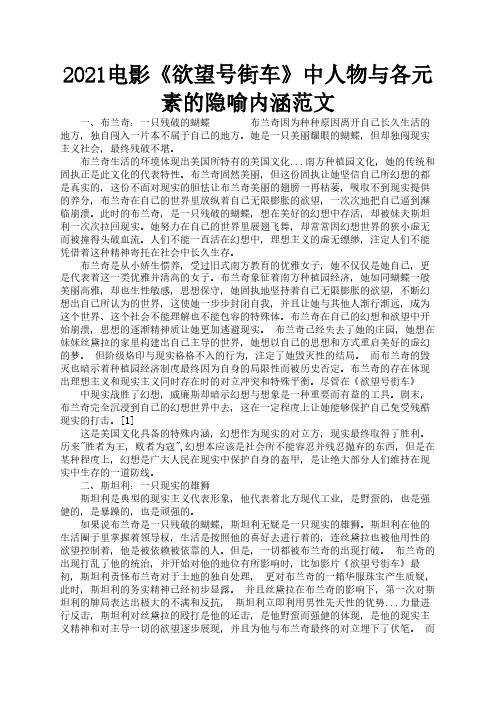
2021电影《欲望号街车》中人物与各元素的隐喻内涵范文 一、布兰奇:一只残破的蝴蝶 布兰奇因为种种原因离开自己长久生活的地方,独自闯入一片本不属于自己的地方。
她是一只美丽耀眼的蝴蝶,但却独闯现实主义社会,最终残破不堪。
布兰奇生活的环境体现出美国所特有的美国文化...南方种植园文化,她的传统和固执正是此文化的代表特性。
布兰奇固然美丽,但这份固执让她坚信自己所幻想的都是真实的,这份不面对现实的胆怯让布兰奇美丽的翅膀一再枯萎,吸取不到现实提供的养分,布兰奇在自己的世界里放纵着自己无限膨胀的欲望,一次次地把自己逼到濒临崩溃。
此时的布兰奇,是一只残破的蝴蝶,想在美好的幻想中存活,却被妹夫斯坦利一次次拉回现实。
她努力在自己的世界里展翅飞舞,却常常因幻想世界的狭小虚无而被撞得头破血流。
人们不能一直活在幻想中,理想主义的虚无缥缈,注定人们不能凭借着这种精神寄托在社会中长久生存。
布兰奇是从小娇生惯养,受过旧式南方教育的优雅女子,她不仅仅是她自己,更是代表着这一类优雅并清高的女子。
布兰奇象征着南方种植园经济,她如同蝴蝶一般美丽高雅,却也生性敏感,思想保守,她固执地坚持着自己无限膨胀的欲望,不断幻想出自己所认为的世界,这使她一步步封闭自我,并且让她与其他人渐行渐远,成为这个世界、这个社会不能理解也不能包容的特殊体。
布兰奇在自己的幻想和欲望中开始崩溃,思想的逐渐精神质让她更加逃避现实。
布兰奇已经失去了她的庄园,她想在妹妹丝黛拉的家里构建出自己主导的世界,她想以自己的思想和方式重启美好的虚幻的梦。
但阶级烙印与现实格格不入的行为,注定了她毁灭性的结局。
而布兰奇的毁灭也暗示着种植园经济制度最终因为自身的局限性而被历史否定。
布兰奇的存在体现出理想主义和现实主义同时存在时的对立冲突和特殊平衡。
尽管在《欲望号街车》 中现实战胜了幻想,威廉斯却暗示幻想与想象是一种重要而有益的工具。
剧末,布兰奇完全沉浸到自己的幻想世界中去,这在一定程度上让她能够保护自己免受残酷现实的打击。
欲望号街车 中文剧本精编版

《欲望号街车》全本人物表白兰琪斯蒂拉斯坦利米奇尤尼斯斯狄夫巴勃罗黑人妇女大夫护士年轻收款员墨西哥妇女第一场【新奥尔良一条街拐角一栋两层楼房的外景。
街名依利恩地段,位于L及N交通沿线与河之间。
这地区虽穷,但却和美国其他城市里相应的地区不同,倒有一种可爱的俗气。
房子大都是白色框架,因风吹日晒已变成灰色,外面有一道摇摇欲坠的楼梯、走廊和装饰古怪的山墙。
楼房有上下两套房间,由一道白色油漆已经脱落的楼梯通往这两套房间的门口。
【这是五月初傍晚天刚黑的时候。
天空衬着朦朦胧胧的白楼房显得特别蔚蓝,使景色增添了优雅的情趣,巧妙地冲淡了落日的气氛。
你仿佛可以嗅到从那黄褐色的河面飘来的热气,河岸远处有一排排散发着香蕉和咖啡清香的仓库。
黑人乐队在街头拐角一家酒吧间里奏出配合气氛的音乐。
在新奥尔良这一地区,你总可以在街角或沿街走不到几家门口,就能听到由棕色的手指在小钢琴上娴熟的演奏出的音乐。
这种“布鲁斯钢琴曲”表达出此地的生活风貌。
【两个妇女,一个白人和一个黑人,正在楼梯上乘凉。
白人妇女是住在楼上套间的尤尼斯;黑人妇女是邻居,因为新奥尔良是个世界性城市,旧城有多名族混杂居住,相处的比较热情和睦。
【街上传来人声,盖住了“布鲁斯钢琴曲”。
【两个男人,斯坦利.科华尔斯基和米奇走到街头拐角。
他们二十八或三十岁左右,随随便便穿着一身蓝色斜纹工作服。
斯坦利拿着他的滚木求外套和一包从肉铺里买来沾着血斑的东西。
他们在楼梯口停下。
斯坦利:(大声喊)喂,喂!斯蒂拉,宝贝!【斯蒂拉从底层平台上走出来。
她是个年轻温厚的女人,二十五岁左右,出身显然和她丈夫大不相同。
斯蒂拉:(温和的)别这样对我嚷嚷。
米奇,你好。
斯坦利:接住!斯蒂拉:什么东西“斯坦利:肉!【他把纸包递给她。
她责怪的叫起来,勉强接住,随即喘着气笑起来。
她丈夫和同伴已转身回街角。
斯蒂拉:(在他后面喊)斯坦利!你去哪儿?斯坦利:打滚木球去!斯蒂拉:我可以来看吗?斯坦利:来吧。
(下)斯蒂拉:一会儿就完了。
“雌雄同体”——田纳西·威廉斯《欲望号街车》中的两个自我
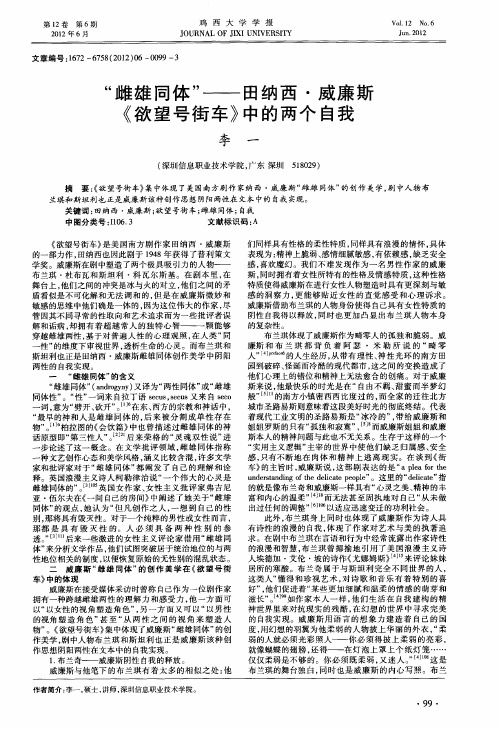
车 》 的体 现 中
威廉斯在接受媒体采访时曾称 自己作为一位剧 作家 拥 有 一 种 跨 越 雌 雄 两 性 的 理 解 力 和 感 受 力 , 一 方 面 可 他 以“ 以女 性 的视 角 塑 造 角 色 ” 另 一 方 面 又 可 以 “ , 以男 性 的 视 角 塑 造 角 色 ” 至 “ 两 性 之 间 的 视 角 来 塑 造 人 甚 从
雌 雄 同体 ” — 田纳 西 ・ 廉 斯 — 威
《 望号街车》 欲 中的两 个 自我
李 一
( 深圳信息职业技术学院 , 广东 深圳 摘 5 82 ) 10 9
要 : 欲望号街车》 中体现 了美国南方剧作 家纳 西 ・ 《 集 威廉斯 “ 雌雄 同体 ” 的创作 美学 , 中人物 布 剧
作者简介 : 李一 , 硕士 , 讲师, 深圳信息职业技术学院。
布兰琪体现 了威廉斯作为畸零人 的孤独和脆弱 。威 廉斯 和 布 兰 琪 都 背 负 着 阿 瑟 ・米 勒 所 说 的 “ 零 畸 人 ”4me 的人生经历 , 带有 理性 、 [ pa ] f6 e 从 神性 光环 的南方 田 园到破碎 、 怪诞而冷酷的现代都市 , 这之 间的变换造成 了 他们心理上 的错位 和精神上无法愈合 的创 痛 。对于威廉 斯来说 , 他最快乐的 时光 是在 “ 自由不 羁、 甜蜜而 半梦幻 般 ” l的南 方 小 镇 密 西 西 比度 过 的 , 全 家 的 迁 往 北 方 】 而 城 市圣路易斯则 意味着这段美好 时光 的彻底终结 。代 表 着现代 工业 文明的圣 路易斯是 “ 冰冷 的”, 给威廉斯 和 带 姐姐 罗斯 的只有 “ 孤独和寂寞” 而威廉斯姐姐和威廉 , 斯 本人 的精 神问题 与此也 不无关 系。生存 于这样 的一个 “ 实用主义逻辑” 主宰 的世界 中使 他们缺 乏归属感 、 全 安 感, 只有不 断地在 肉体 和精 神 上逃 离现 实 。在 谈到 《 街 车》 的主 旨时 , 威廉斯 说 , 这部 剧表达 的是 “ l rt ap af e e o h ud ra d go edl a epe o 这里 的 “ e ct” n e t i f h ei t po l” sn n t ce dlae 指 i 的就是像布兰奇和威廉斯一样 具有 “ 心灵之美 、 精神 的丰 富和内心的温柔 ” j j而无法甚至 固执 地对 自己“ 从未 做 出 过 任 何 的 调 整 ” 以适 应 迅 速 变迁 的功 利 社 会 。 ” 此外 , 布兰琪身 上同时 也体现 了威廉 斯作 为诗人 具 有诗性的浪漫的 自我 , 体现 了作 家对艺 术与美 的执著 追 求。在 剧中布兰琪在 言语 和行 为中经常流露 出作 家诗 性 的浪漫和智慧 , 布兰 琪 曾揶 揄地 引用 了美 国浪 漫主义 诗 人埃德加 ・ 艾伦 ・ 坡的诗作《 尤娜姆斯》 1 J 来评论妹 妹 居所的寒酸 。布兰奇 属于 与斯坦利 完全 不 同世 界 的人 , 这类人“ 懂得 和珍 视艺 术 , 诗歌 和音乐 有 着特 别 的喜 对 好”, 他们促进着“ 某些更加 细腻 和温柔 的情 感的 萌芽和 滋 长 ” 如 作 家 本 人 一 样 , 们 生 活 在 自我 建 构 的 精 。 他 神世界里来对抗现实 的残酷 , 幻想 的世界 中寻求完 美 在 的 自我实 现。威廉 斯用 语 言 的想象 力建 造 着 自己的 国 度, 用幻想 的羽翼 为他柔弱 的人物披 上华 丽的外 衣 , 柔 “ 弱 的人就必须 光彩照 人—— 你必须 得披 上柔弱 的亮 彩 , 就像蝴蝶 的翅 膀 , 得—— 在灯 泡上 罩上个 纸灯 笼 …… 还 仅仅柔弱是不 够 的。你 必须 既柔弱 , 迷人 。 这是 又 ” 布 兰琪 的舞 台独 自, 同时也 是威廉 斯 的内心写 照 。布 兰
田纳西·威廉斯《欲望号街车》中的象征意义
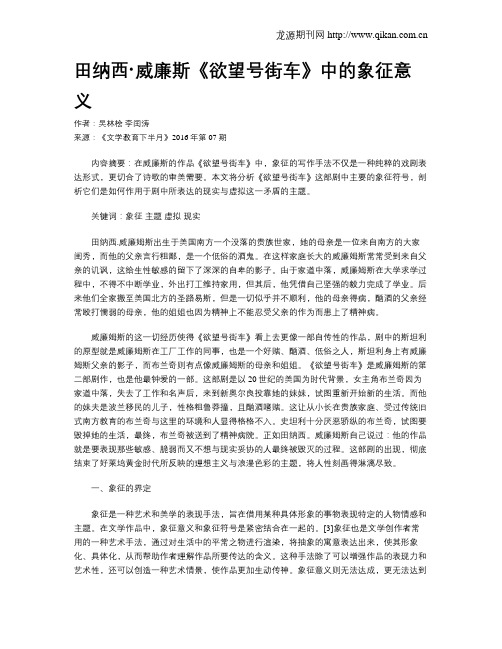
田纳西·威廉斯《欲望号街车》中的象征意义作者:吴林桧李闰涛来源:《文学教育下半月》2016年第07期内容摘要:在威廉斯的作品《欲望号街车》中,象征的写作手法不仅是一种纯粹的戏剧表达形式,更切合了诗歌的审美需要。
本文将分析《欲望号街车》这部剧中主要的象征符号,剖析它们是如何作用于剧中所表达的现实与虚拟这一矛盾的主题。
关键词:象征主题虚拟现实田纳西.威廉姆斯出生于美国南方一个没落的贵族世家,她的母亲是一位来自南方的大家闺秀,而他的父亲言行粗鄙,是一个低俗的酒鬼。
在这样家庭长大的威廉姆斯常常受到来自父亲的讥讽,这给生性敏感的留下了深深的自卑的影子。
由于家道中落,威廉姆斯在大学求学过程中,不得不中断学业,外出打工维持家用,但其后,他凭借自己坚强的毅力完成了学业。
后来他们全家搬至美国北方的圣路易斯,但是一切似乎并不顺利,他的母亲得病,酗酒的父亲经常殴打懦弱的母亲,他的姐姐也因为精神上不能忍受父亲的作为而患上了精神病。
威廉姆斯的这一切经历使得《欲望号街车》看上去更像一部自传性的作品,剧中的斯坦利的原型就是威廉姆斯在工厂工作的同事,也是一个好赌、酗酒、低俗之人,斯坦利身上有威廉姆斯父亲的影子,而布兰奇则有点像威廉姆斯的母亲和姐姐。
《欲望号街车》是威廉姆斯的第二部剧作,也是他最钟爱的一部。
这部剧是以20世纪的美国为时代背景,女主角布兰奇因为家道中落,失去了工作和名声后,来到新奥尔良投靠她的妹妹,试图重新开始新的生活。
而他的妹夫是波兰移民的儿子,性格粗鲁莽撞,且酗酒嗜赌。
这让从小长在贵族家庭、受过传统旧式南方教育的布兰奇与这里的环境和人显得格格不入。
史坦利十分厌恶骄纵的布兰奇,试图要毁掉她的生活,最终,布兰奇被送到了精神病院。
正如田纳西。
威廉姆斯自己说过:他的作品就是要表现那些敏感、脆弱而又不想与现实妥协的人最终被毁灭的过程。
这部剧的出现,彻底结束了好莱坞黄金时代所反映的理想主义与浪漫色彩的主题,将人性刻画得淋漓尽致。
欲望号街车 ( a streetcar named desire)原创
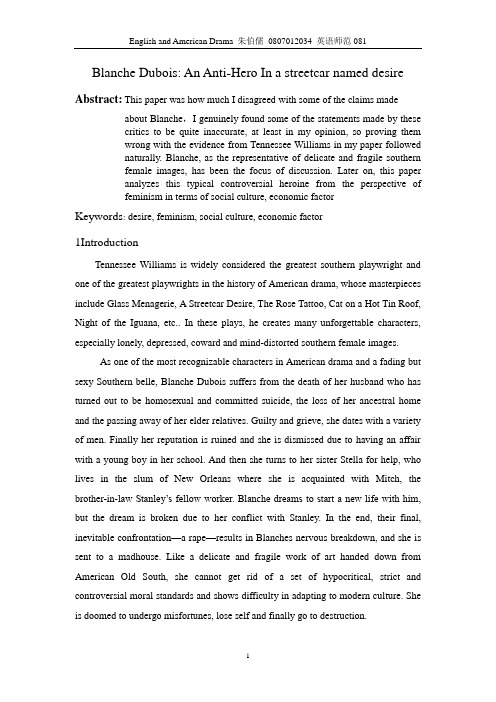
Blanche Dubois: An Anti-Hero In a streetcar named desire Abstract:This paper was how much I disagreed with some of the claims made about Blanche,I genuinely found some of the statements made by thesecritics to be quite inaccurate, at least in my opinion, so proving themwrong with the evidence from Tennessee Williams in my paper followednaturally. Blanche, as the representative of delicate and fragile southernfemale images, has been the focus of discussion. Later on, this paperanalyzes this typical controversial heroine from the perspective offeminism in terms of social culture, economic factorKeywords: desire, feminism, social culture, economic factor1IntroductionTennessee Williams is widely considered the greatest southern playwright and one of the greatest playwrights in the history of American drama, whose masterpieces include Glass Menagerie, A Streetcar Desire, The Rose Tattoo, Cat on a Hot Tin Roof, Night of the Iguana, etc.. In these plays, he creates many unforgettable characters, especially lonely, depressed, coward and mind-distorted southern female images.As one of the most recognizable characters in American drama and a fading but sexy Southern belle, Blanche Dubois suffers from the death of her husband who has turned out to be homosexual and committed suicide, the loss of her ancestral home and the passing away of her elder relatives. Guilty and grieve, she dates with a variety of men. Finally her reputation is ruined and she is dismissed due to having an affair with a young boy in her school. And then she turns to her sister Stella for help, who lives in the slum of New Orleans where she is acquainted with Mitch, the brother-in-law Stanley‟s fellow worker. Blanche dreams to start a new life with him, but the dream is broken due to her conflict with Stanley. In the end, their final, inevitable confrontation—a rape—results in Blanches nervous breakdown, and she is sent to a madhouse. Like a delicate and fragile work of art handed down from American Old South, she cannot get rid of a set of hypocritical, strict and controversial moral standards and shows difficulty in adapting to modern culture. She is doomed to undergo misfortunes, lose self and finally go to destruction.2 From the perspective of Tennessee WilliamsThrough the play , Wi lliams‟s sympathies lie with Blanche; this sympathy condemns the environment that has brought about Blanches tragic circumstances. Sympathy for Blanche in A Streetcar Named Desire is found in large part from the obvious trauma she has experienced due to the loss of her beloved husband, Allan Grey. Ironically, this aspect of the play is also one that critics and readers frequently use to demonize Blanche and disprove her role as a sympathetic character. critics claim Williams believes Blanche behaved hatefully toward her husband or failed him in some manner, leading to the death she now laments and Blanche had a responsibility as a wife to somehow rescue her husband from his own sexuality However, this claim compared with the trauma that the death has caused Blanche, and the implications of the overwhelming love she felt for Allan Grey may have been the last true emoti on‟Evidence also shows that the traumatic loss of her husband was a driving force that leads Blanche to Stella‟s doorstep. The scandalous event s that drive Blanche to her ultimate defeat do not begin until after Allan‟s death, and she even admits, “After the death of Allan—intimacies with strangers was all I seemed able to fill my empty heart with . . . I think it was panic, just panic, that drove me from one to another, hunting for some protection”. Williams implies that Blanche is not inherently impious; the disintegration of the loving marriage she once clung to leads her to a wrong path.Another situation in which Williams shows sympathy toward Blanche is her most dramatic victimization in the play: her rape. This scene requires careful analysis to understand that Stanley‟s rape of Blanche is indeed an antagonistic victimization, some claim that Williams goes to great lengths to obscure the fact that rape is a political crime ,making this seem a crime of passion and desire rather than one of violence, cruelty, and revenge .However, this argument is in complete dissonance with the obvious signs of Blanches noncompliance in the rape and utterly ignores Williams‟s vilification of Stanley throughout the play. In addition to Blanches evident noncompliance, Williams‟s vilification of Stanley throughout the entire play draws aclear distinction between victim and villain in the rape scene. Upon Stanley‟s first appearance, Williams describes how “he seizes women up at a glance . . . crude images flashing into his mind and determining the way he smiles at them,” and in the next line Blanche not coincidentally “draw s involuntarily back from his stare” (25). This significant exchange sets the mood for the tension between Blanche and Stanley that continues throughout the play. Several times Blanche regards Stanley with a “look of panic” or a “frightened look”, subtle stage directions that further Stanley‟s dark portrayal and foreshadow his victimization of Blanche. The fact that Stanley is characterized as erotic and Blanche merely as mentally weak and insecure reflects where Williams‟s sympathies lie; it does not imply that Blanche brings on Stanley‟s womanizing cruelty but rather that any woman could become his prey. Williams establishes Blanche‟s role as Stanley‟s victim far earlier on in the play than his physical domination of her, and Stanley‟s menacing characterization implies that Blanche‟s flawed chara cter does not give her singular potential to fall victim to him.In A Streetcar Named Desire‟s final scene, Williams makes his sympathetic tone toward Blanche tangible by exploiting her vulnerability before the indifference of the people and society that surrounds her. In addition to the ir onic comment “I have always depended on the kindness of strangers”, Blanche‟s vulnerability is also illuminated through stage directions such as “a look of sorrowful perplexity as though all human experience shows on her face” and “She turns her face to [the doctor] and stares at him with desperate pleading”. Blanches vulnerability leaves her sharply exposed before the cold unresponsiveness of the people who witness her defeat and represent the society in which she has been immersed: the men‟s poker game resumes abruptly after her dramatic exit, Blanches own sister Stella returns her pleas delivered in a “frightening whisper” by staring blankly back at her in a “moment of silence”, and Eunice simply responds to her claim of rape with, “Don‟t ever believe it. Life has got to go on”. The other characters in the play, representative of the era‟s misogynistic society, choose to disregard Blanches plight in accordance with what society expects. Blanche has fallen victim to the brutality of male dominance, yet even the women around her turn a blind eye to her suffering in order to avoid any disruption of theireveryday lives.One can easily deduce Williams‟s sympathy toward Blanche throughout the play and even in the circumstances of her downfall, which gives greater insight into both Williams‟s perceptions of her role as a character and his own views. Although at first glance Blanches checkered sexual past and addiction to the attention of men seem to safely secure her a pigeonhole in a womanizing society, in reality her experiences have only broken down her weak spirit and driven her to her downfall. Because of Williams‟s sympathy, Blanche becomes a tra gic protagonist in A Streetcar Named Desire and transforms the play into a sort of allegory: Williams uses her plight to criticize the social circumstances that have both shaped her flawed persona and led to her demise. This social commentary leaves Williams‟s motivations in question: as a homosexual male, why exactly is Williams so sympathetic toward Blanche? One possibility is that Williams‟s homosexuality in a heavily masculine society rendered him naturally sympathetic toward the plight of women, with whom he probably identified more than with the archetypical male of the era. Another explanationis that, as a homosexual, Williams criticized heterosexuality itself, condemning the sexuality that turns Blanche into a victim, Stanley into a monster, and the rest of the characters into puppets on socio-cultural strings. Altho ugh Williams‟s personal motives are debatable, the story he creates with Blanche Dubois presents a clearly sympathetic portrait of a woman .3. Social cultureIt is reasonable that almost every person‟s fame is closely related to the place where he/she grows up, so it is necessary to probe into briefly the history of the South and its cultural background in order to have a deeper investigation of the heroine‟s destruction. The prewar South is full of contradictory memories. The Southern plantation economy set a division between planters and slaves. The slaves worked all-day long under the whip, whereas the rich planters behaved like feudal lords and lived a luxury life. Under the influence of such an economic environment, the upper class of the South believ ed “itself to be unique, because it projected itself as suchthrough its writers and spokesmen, because it manufactured a folklore of plantation aristocracy, of the magnolia paradise of the antebellum days, of the Greek society and the peculiar institution of slavery, of the Lost Cause, of White Supremacy, and of the need to be born there to understand it all, and Southerners repeated this litany so many times that it became true—or almost so.” (Horton, 1987: 377) Then the framework of the South can be established: its social pattern is based on manor; its civilization is Permeated with idealized chivalry; its ruling class behaves as an aristocracy, either a gentleman or a lovely lady. They live in large mansions, own lots of estates, and have colorful soci al life. It is a “world singularly polished and mellow and poised, wholly dominated by ideals of honor and chivalry and noblesse” (Li, 2004: 21), where Blanche was brought up and used to live for years. In fact, the self-contained and self-sufficient South is an epitome of patriarchal society. Simone de Boudoir points out in her book The second sex, “males don‟t interpret females according to females Themselves, whereas they regard females as independent ones… males can be taken as the reference to define and distinguish females, while the reference to define and distinguish males cannot be females. …She‟ is the Essential in opposition of the Inessential. …He‟ is the subject and the Absolute, whereas …she‟ is the other.” (Boudoir, 1998:11) From the above arguments, it can be seen that there exists a relation of subordination and dominance, the essential and inessential, object and subject, and the other and self between males and females. Therefore, in patriarchal society, males stand at a positive position and females play a passive and inessential role. Charlotte Perkins Gilman also considers gender as the core of analysis to reveal the fact of gender oppression, pointing out that the females‟ dependence on males is not due to physiological difference but the result of coercive act of male culture (Jin, 2004:367). Particularly Kate Millet holds in Sexual Politics that the gender relation between males and females is a kind of power one, that is “sexual politics” (Jin, 2004:595). Similarly, in the south, the men as the center of the society control money, power and even women. They form their own standards to evaluate the society and other people. Women live a life of dependence on them, both economically and mentally. And there is another obvious feature here. That is the tendency toward idealism, romanticismand hedonism. Women have to keep beautiful appearance, behave graciously and flirt with men in order to please them. It is inevitable that women would lose their self when faced with traditional customs and strict standards set by men.4. Economical factorMarxism feminist theory argues that economic factor is the root of the oppression that women suffer from (Luo, 2004:100). The economic dependence on men deprives women of the right to dominate their own fate and the strength to struggle against men so that they are reduced into the other affiliated by men. British writer, Virginia Woolf thinks that women‟s independent economic status is the material foundation to obtain personal freedom. If women are dependent on men economically, they are deprived of all the equal rights (Wu, 2005:69). The economic structure of plantation in the South removes women from productive labor so that they cannot obtain the independent economic status. Even if Blanche is forced to work outside because of economic necessity, she has to choose to be a teacher in a high school which is regarded as a decent occupation of women. And as Blanche tells Mitch her miserable situation, “A teacher‟s salary is barely sufficient for her living expenses. I didn‟t save a penny last year and so I had to come here for the summer.”(Williams, 2005:1179) Evidently, her meager incomes are barely enough to maintain her extravagant life. So, it is quite natural that she has to turn to men for help after the suicide of her husband, death of relatives and loss of her manor, and she considers it the only choice to face the cruel environment, as she says, “Whoever you are-I have always dependedon the kindness of strangers” (Williams, 2005:1203) She is in and out through the gate of the second-rate hotel of Laurel and keeps dating with different men until she is banished from the town. Then she doesn‟t have any thing to her name except a dishonorable past and a trunk that just contains her clothes and some worthless papers, so she has no alternative but to seek refuge from her sister Stella in New Orleans. In Stella‟s house, she seduces her brother-in-law Stanley when meeting him for the first time, because she understands that she needs his financial support when she stays there. She says, “…maybe he (Stanley) is what we need to mix with our blood nowthat we‟ve lost Belle Reve.”(Williams, 2005:1156) But her behavior of Southern culture of delicacy and romance doesn‟t fit in with Stanley who is an animalize d person with peevish disposition. It is an irony that just immediately after she resolves to Stella at the poker night “I‟m going to do something. Get hold of myself and make myself a new life,” (Williams, 2005:1166), she turns to a married millionaire S hep Huntleigh for financial support. Her excuse is that she only has “sixty-five measly cents in coin of the realm” in the purse. Thus having recourse to this millionaire seems an effective means “to get hold of some money” and “the way out.” (Williams, 2005:1166) However, the help call and the message are not sent out. And her next proposal is Stanley‟s fellow worker Mitch, by whom she wants to get rid of the destitution and the dependence on Stanley. She thinks if the marriage with Mitch happens, she can “leave here (Stella‟s home), and not be anyone‟s problem” (Williams, 2005:1173) and live a stable life. But things do not turn out as one wishes. When knowing her past, Mitch abandons her ruthlessly. After she parts company with Mitch, she is so depressed that she creates an illusion for herself, in which she has received a telegram form Shep Huntleigh inviting her to a cruise of the Caribbean on a yacht. Without exception her luxurious life is again built on the support of men, even in an illusion. Actually, this millionaire may not exist at all, and just appears an imagined person in Blanche‟s one-sided statement. He stands for an ideal symbol that can bring material strength of dependence and guarantee for women, more exactly for Blanche. That he never shows up and gives the substantial aid to Blanche may suggest that if women place their hope and fortune on men, their oppressed and subordinate status can never be changed, and their dream of happy life is bound to break. In short, women‟s economic depende nce on men in patriarchal society serves as one of factors that result in Blanche‟s destruction.5.ConclusionBlanche is one of such females born and brought up in Old South who feels difficult in mastering her own fate and facing conflicts brought by industrialization and commercialization under the restriction and oppression of patriarchy, and onlyhides herself in imaginative world to release herself. Williams extends his great sympathy to this victim of patriarchy. However, it is evident from what Williams depicts about women that once they yield themselves to patriarchy, instead of struggling indomitably for their freedom, their miserable situation will not be changed.REFERENCES[1]Beauvoir, Simone de. (1998). The second sex. (Tao Tiezhu, Trans.). Beijing: China Books Press.[2]Horton, Rod W. & Edwards, Herbert W.. (1987). Backgrounds of American literary thought (3rd ed.).[3]JIN Li. (2004). Literary females and female literature. Beijing: Foreign Language Teaching and Researching Press.[4]LI Li. (2004). Women‟s growth: a feminist approach to Tennessee Williams‟s works. Tianjin: Tianjin[5]People‟s Publishing House. [4]LUO Ting. (2004). Feminist literary criticism in West and China. Beijing: China Social Science Press.[6]Williams, Tennessee. A streetcar named desire. Alison Booth, J. Paul Hunter, & Kelly J. Mays (Eds.)。
论田纳西·威廉斯《欲望号街车》的现代喜剧色彩
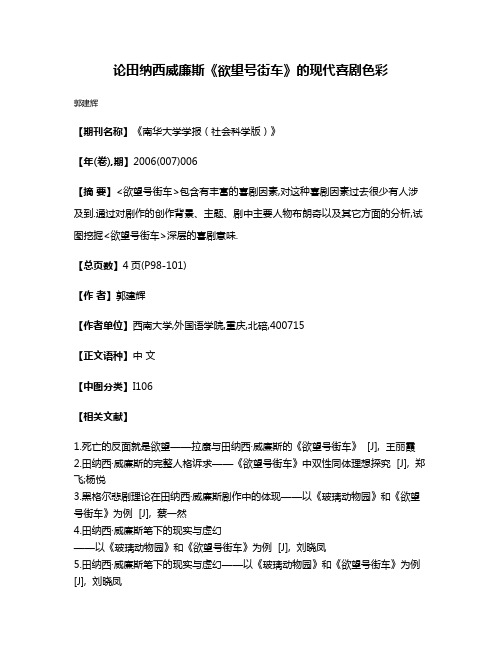
论田纳西威廉斯《欲望号街车》的现代喜剧色彩
郭建辉
【期刊名称】《南华大学学报(社会科学版)》
【年(卷),期】2006(007)006
【摘要】<欲望号街车>包含有丰富的喜剧因素,对这种喜剧因素过去很少有人涉及到.通过对剧作的创作背景、主题、剧中主要人物布朗奇以及其它方面的分析,试图挖掘<欲望号街车>深层的喜剧意味.
【总页数】4页(P98-101)
【作者】郭建辉
【作者单位】西南大学,外国语学院,重庆,北碚,400715
【正文语种】中文
【中图分类】I106
【相关文献】
1.死亡的反面就是欲望——拉康与田纳西·威廉斯的《欲望号街车》 [J], 王丽霞
2.田纳西·威廉斯的完整人格诉求——《欲望号街车》中双性同体理想探究 [J], 郑飞;杨悦
3.黑格尔悲剧理论在田纳西·威廉斯剧作中的体现——以《玻璃动物园》和《欲望号街车》为例 [J], 蔡一然
4.田纳西·威廉斯笔下的现实与虚幻
——以《玻璃动物园》和《欲望号街车》为例 [J], 刘晓凤
5.田纳西·威廉斯笔下的现实与虚幻——以《玻璃动物园》和《欲望号街车》为例[J], 刘晓凤
因版权原因,仅展示原文概要,查看原文内容请购买。
欲望号街车(译文经典)

精彩摘录
这是《欲望号街车(译文经典)》的读书笔记模板,可以替换为自己的精彩内容摘录。
感谢观看
欲望号街车(译文经典)
读书笔记模板
01 思维导图
03 读书笔记 05 作者介绍
目录
02 内容摘要 04 目录分析 06 精彩摘录
思维导图
本书关键字分析思维导图
戏剧
悲剧
街车
社会
导言
街车
简介
经典
欲望号
方式 欲望号
舞台
欲望号
世界
年表
演职员表
内容摘要
美国20世纪备受争议的天才剧作家田纳西·威廉斯的扛鼎之作,同名电影由影史传奇费雯·丽和马龙·白兰 度主演。纤毫毕现的南方式绝望,粗暴的情欲,彻底的堕落,极乐的疯狂;破碎世界的梦幻缩影,激烈而又惊悚 的亲密关系,动物般的肉体与征服。《欲望号街车》女主人公布兰奇是典型的南方淑女,家庭败落以后,不肯放 弃旧日的生活方式,逐渐堕落腐化,后来不得不投靠妹妹斯黛拉。但又与妹夫斯坦利粗暴的生活方式格格不入, 继而遭妹夫强奸,最后被送进疯人院。现代社会中野蛮残忍的势力无情地蹂躏温柔优雅的弱者,《欲望号街车》 无疑是向社会发出了一声振聋发聩的嘶喊——是谁把布兰奇逼疯了!1947年该剧在纽约上演后获得巨大成功,囊 括美国三项戏剧大奖:普利策奖、纽约戏剧奖和唐纳德森奖。阿瑟米勒称“《欲望号街车》的首演等于是在商业 戏剧的土地上插上了一面美的旗帜”。
读书笔记
“满腔悲哀,满腔情欲。 “威廉斯还赋予一个堕落女性形象男性同性恋的实质”,更大的悲剧。 我们无法真正地理解对方,无法真正地知道真实与虚假,因为我们无法诚实地面对自己。 后面的主题辨析真的太绝了!Who told you I wasn't——"straight"?。 看完原著发现翻拍的电影确实相当出色,白兰度和费雯丽演活了斯坦利的原始粗暴和兰奇的神经质和优雅。 来读这本书最大的原因在于摩登家庭这部剧。 主题解析很棒,让我更深刻理解了故事真谛,社会造就了悲哀的人生,人性的贪婪刚好触碰到欲望的陷阱! 无奈……。 对话精妙,人物刻画特别好,但对于同性恋这个隐晦描写,真的没看出来,我太笨了,不去想的话,真的想 不到。 从时间线上来讲,《欲望号街车》是《飘》的延续。 《欲望号街车》:大学一年级新学期开学没多久,便在电影选修课上看了这部电影。
《欲望号街车》中的两性冲突及其隐喻性
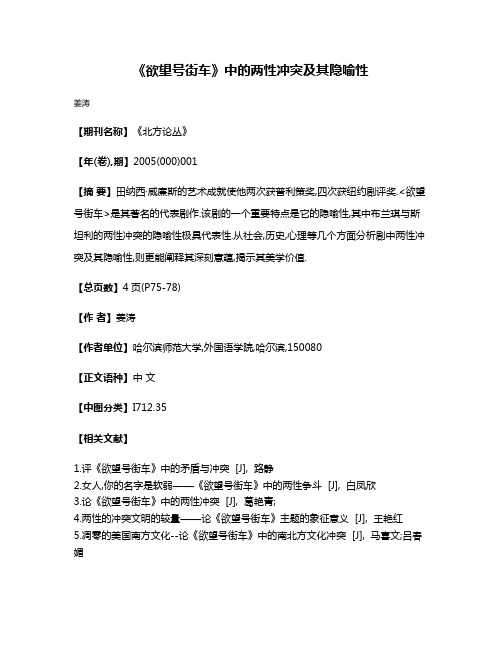
《欲望号街车》中的两性冲突及其隐喻性
姜涛
【期刊名称】《北方论丛》
【年(卷),期】2005(000)001
【摘要】田纳西·威廉斯的艺术成就使他两次获普利策奖,四次获纽约剧评奖.<欲望号街车>是其著名的代表剧作.该剧的一个重要特点是它的隐喻性,其中布兰琪与斯坦利的两性冲突的隐喻性极具代表性.从社会,历史,心理等几个方面分析剧中两性冲突及其隐喻性,则更能阐释其深刻意蕴,揭示其美学价值.
【总页数】4页(P75-78)
【作者】姜涛
【作者单位】哈尔滨师范大学,外国语学院,哈尔滨,150080
【正文语种】中文
【中图分类】I712.35
【相关文献】
1.评《欲望号街车》中的矛盾与冲突 [J], 路静
2.女人,你的名字是软弱——《欲望号街车》中的两性争斗 [J], 白凤欣
3.论《欲望号街车》中的两性冲突 [J], 葛艳青;
4.两性的冲突文明的较量——论《欲望号街车》主题的象征意义 [J], 王艳红
5.凋零的美国南方文化--论《欲望号街车》中的南北方文化冲突 [J], 马喜文;吕春媚
因版权原因,仅展示原文概要,查看原文内容请购买。
- 1、下载文档前请自行甄别文档内容的完整性,平台不提供额外的编辑、内容补充、找答案等附加服务。
- 2、"仅部分预览"的文档,不可在线预览部分如存在完整性等问题,可反馈申请退款(可完整预览的文档不适用该条件!)。
- 3、如文档侵犯您的权益,请联系客服反馈,我们会尽快为您处理(人工客服工作时间:9:00-18:30)。
第一幕ST Sister Blanche, I've got a little birthday remembrance for you. I hope that you like it.B Why- Why, it's aST It's a ticket! Back to Auriol! On a bus! Tuesday!S Blanche!You didn't need to do that.ST Don't forget all that I took off her.S You don't need to be so cruel to someone alone as she is. –ST Delicate article as she is.S She is! She was! You didn't know Blanche as a girl. Nobody, nobody, was as tender and trusting as she was. But people like you abused her, and forced her to change.B Oh, stop it!S Why did you do this to her?ST Let go of my shirt.S I want to know why. Tell me why.ST The first time, baby, when we first met, me and you , baby, you thought I was common as dirt. How right you was, I was common as dirt. And wasn't we happy together, wasn't all okay till she showed here? Hoity-toity, describing me like an ape.Stella! What 's the matter with you?B Honey, what's the matter with you?ST Did I hurt you?B Honey? What is it?S Take me to the hospital.第二幕B Who is it , please?M Me- me, me. Mitch.B Hello Mitch! Y' know, I really shouldn't let you in after the treatment I have received from you this evening! So utterly uncavalier! But I forgive you. I forgive you because it' s such a relief to see you. You've stopped that polka tune that I had caught in my head.How's your mother? Is your mother ill?M Why?B Why, what's the matter with you tonight? But never mind,I'll just- pretend I don't notice anything different about you! That- music a gain…M What music?B The polka tune they were playing when Allan- wait!There! That shot! It always stops after that. Yes, now it's stopped.M Are you boxed out of you r mind?B I cant hear what u r saying ,Had you forgotten your invitation to supper?M I wasn't going to see you any more.B What's in your mind? I see something in your eyes!M I've never seen you in the light, that's a fact! I've never had a real good look at you, Blanche,Let's turn on the light in here.B Light? Which light? What for? Oh! What did you do that for?M So I can take a look at you good and plain!B Of course you don't really mean to be insulting!M No, just realistic.B I don't want realism. I want magic!M Magic!B Yes, yes, magic!I try to give that to people. I do misrepresent things. I don't tell the truth,I tell what ought to be truth.DON'T TURN THE LIGHT ON…M Oh, I don't mind you being older than what I thought, But- but, all the rest of it- Oh! The pitch about your ideals being so old-fashioned,But I was a fool enough to believe you was straight.B Who told you I wasn't- 'Straight'? My loving brother-in-law. And you believe him.M No! No! I called him a liar at first. And then I checked on the story.Didn't you stay at a hotel called the Flamingo?B Flamingo? NO! Tarantula was the name of it!M Tarantula Arms?B Yes, a big spider! Yes, I've had many meeting with strangers.After the death of Allan- intimacies with strangers was all I seemed able to fill my empty … .. it was panic, just panic, that drove me searching for some protection- even, at last, in a seventeen-year-old boy but- I was played out. You know what played out is?M I thought you were straight. –B Straight? What's straight?A line can be straight or a street, but the heart of a human being…M You lied to me, Blanche. –B Don't say I lied to you.M Lies, lies, inside and out, all lies. –B Never inside, I never lied in my heart…卖花人- Flores!…Flores para los muertos … - Flores!…Flores para los muertos …B What? Oh! Someone outside.卖花人Crona! Crona! Crones para los muertos… Flowers! Flowers for the dead.祭奠死者的花,要不要?B No, no! not now! not now!I lived into the house once where death was as close as you are…The opposite is desire. How could you wonder? How could you possibly wonder!Marry me, Mitch! –M No. I don't think I want to marry you any more.B No? –M You're not clean enough to bring in the house with my mother.B Get out of here before I start screaming. Get out of here quick before I start screaming!第三幕ST Blanchy…B Oh, StanleyST What've you got the fine features out for? –B Oh, that's right. You left before my wire came.ST Oh, you got a wire?B I received a telegram from an old admirer of mine.ST - Anything good? –B I think so. An invitation.ST - What to?B - A cruise of the Caribbean on a yacht!ST - Who did you say it was from?B An old beau of mine. Mr. Shep Huntliegh,. I didn't seen him for a while.ST This millionaire isn't going to interfere with your privacy none?B This man is a gentleman and he respect me. What he want is my companionship.A cultivated woman, can enrich a man's life. .Physical beauty is passing. But beauty of the mind and richness of the spirit and tenderness of the heart increase with the years! Oh- How strange that I should be called a destitute woman! I think of myself as a very, very rich woman! But I have been foolish.ST Swine huh ?B Yes, swine! And I'm thinking not only of you but of your friend, Mr. Micthell. He came here tonight, And to repeat slander to me, vicious stories that he had gotten from you!I gave him his walking papers… But then he returned. He returned with a box of roses to beg my forgiveness!But something's are not forgivable. So I said to him, "thank you,"So farewell, my friend! And let there be no hard feelings…ST as this before or after you got the telegram?B Telegram? What telegram! Oh! As a matter of fact, my wire came just asST As a mater of fact, there wasn't no wire at all! There is no millionaire! And Mitch didn't come in here with roses' cause I know where he is- There isn't a goddam thing but imagination! and lies and conceit and tricks! Take a look at yourself in that worn-out MardiGras outfit, and with the crazy crown on. What kind of queen do you think you are? You know that I don’t like you from the start! You came in here and you spray perfume and you stick a paper lantern over the light bulb and make youself into the Queen.Sitting on your throne and swilling down my liquor! You know what I say? Ha!- Ha!- Ha! Do you hear me? Ha!- Ha!- Ha!卖花者Flores. Flores. Flores para los muertos! Corones. Corones para los muertos. Flowers. Flores para los muertos! 花!祭奠死者的花!B Oh, no! not now.Operator! Operator! Get me western Union.Do you hear me? Do you hear me? Take down this message!"In desperate, desperate circumstances! Caught in a trap. Help me! Caught in a trap!", Oh!第四幕旁白:now, they want to send blanchy to psychological hospital…ST Would you mind waiting outside a second? She's…DOCTOR --Surely!ST Someone is calling for Blanche.B It is for me, then!Is it the gentleman I was expecting from Dallas?ST Yes!B yes, honey. I believe it is. – I'm not - not- quite ready.ST Everything packed? –Shall we go now, Blanche?S Stanley, she'll be out in a minute.I'll go with you.B How do I look?S Lovely. - Lovely.B You are not the gentleman I was excepting. S Did you forget something, Blanche? –B Yes! Yes- I forgot something!S What are they going to do? Don't let them hurt her!What did you forget, Blanche?DOCTOR It does’t matter. We can pick it up later. –ST Sure. We can send it along with the trunk.B I don't know you- I don't know you. I want to be- left alone- please!ST Now, Blanche! you left nothing here -unless it's the paper lantern you want to take with you. You want the lantern? DOCTOR Miss Dubois-- Please. - It' won't be necessary.B Ask him to let go of me.DOCTOR Yes- let go.B Whoever you are, I have always depended on the kindness of strangers。
